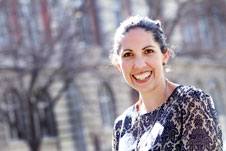 Tuesday 4 April 2017 2:36pm
Tuesday 4 April 2017 2:36pm
Dr Emma Wyeth
Māori experience considerable longer-term disability after injury, new University of Otago analysis of patient-reported and Accident Compensation Corporation (ACC) data shows.
A paper appearing in the Australian and New Zealand Journal of Public Health shows that disability rates for Māori two years post-injury were at 19 per cent.
Dr Emma Wyeth, who led the study, says that previous research has shown that Māori experience at least twice as much injury-related health burden than non-Māori .
The findings are from the Prospective Outcomes of Injury Study (POIS), led by Associate Professor Sarah Derrett, who directs the University's Injury Prevention Research Unit. POIS was funded by the Health Research Council of New Zealand (HRC), with co-funding from ACC. Dr Wyeth and colleagues investigated the long-term disability outcomes for Māori ACC claimants two years after injury, and the factors that contribute to this.
Dr Wyeth says the team found that pre-injury and injury-related factors predicted long-term disability and should be focused on to reduce the longer-term disability burden for Māori.
“These factors include people with an inadequate household income pre-injury or with two or more chronic health conditions being at increased risk of disability,” she says.
Dr Wyeth says that the study results also suggest that injured Māori have difficulties accessing health services such as general practices and hospitals and that this can lead to long-term disability.
Even when Māori are able to access health services, including ACC, less equitable outcomes compared to non-Māori are still apparent, she says.
Dr Wyeth is now leading a new HRC-funded project to confirm specific areas and factors that health services should be focusing on to improve Māori post-injury outcomes and reduce the burden of post-injury disability.
For more information, contact:
Dr Emma Wyeth
Director – Ngāi Tahu Māori Health Research Unit
Department of Preventive & Social Medicine
University of Otago
Tel 03 479 4064
Email emma.wyeth@otago.ac.nz
A list of Otago experts available for media comment is available elsewhere on this website.
Electronic addresses (including email accounts, instant messaging services, or telephone accounts) published on this page are for the sole purpose of contact with the individuals concerned, in their capacity as officers, employees or students of the University of Otago, or their respective organisation. Publication of any such electronic address is not to be taken as consent to receive unsolicited commercial electronic messages by the address holder.